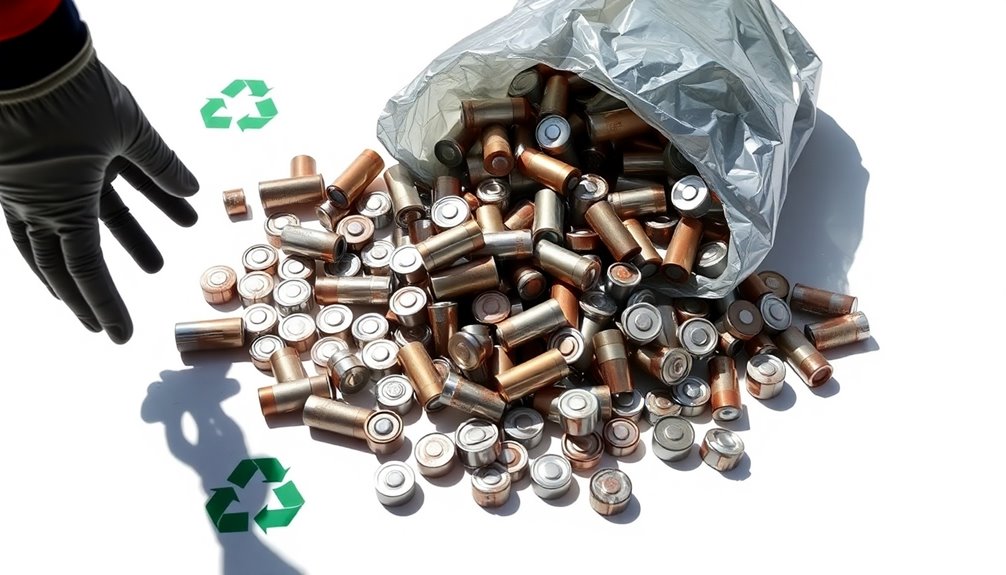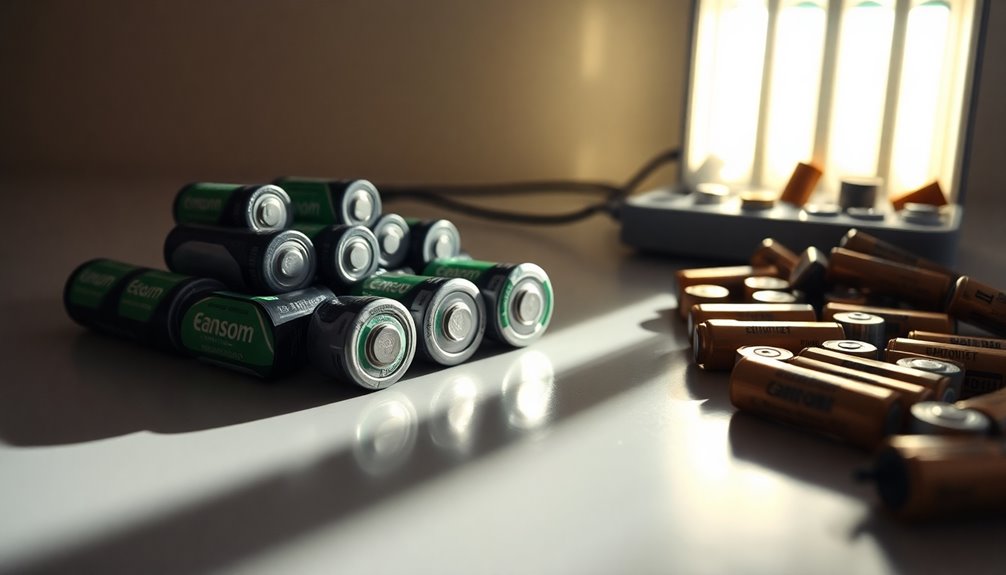You can't just toss batteries in the trash. While some small, non-rechargeable batteries are acceptable in certain areas, many types, especially larger and rechargeable ones, require specialized recycling. Improper disposal can release toxic chemicals into the environment, threatening soil and groundwater. In states like California, all batteries must be recycled, while other states have varied regulations. By learning the correct disposal methods, you not only comply with the law but also help protect the planet. If you're curious about specific battery types and their proper handling, there's plenty more to uncover.
Key Takeaways
- Small non-rechargeable batteries can typically be thrown in the trash, except in California where they must be recycled.
- Larger batteries, including rechargeable and vehicle batteries, require designated recycling and cannot be disposed of in regular trash.
- Alkaline batteries are generally safe for trash disposal, but California mandates recycling due to environmental concerns.
- Improper battery disposal can lead to toxic chemicals leaching into soil and groundwater, causing significant pollution risks.
- Always check local regulations for battery disposal, as laws vary by state and improper disposal may result in penalties.
Can You Throw Batteries Away?
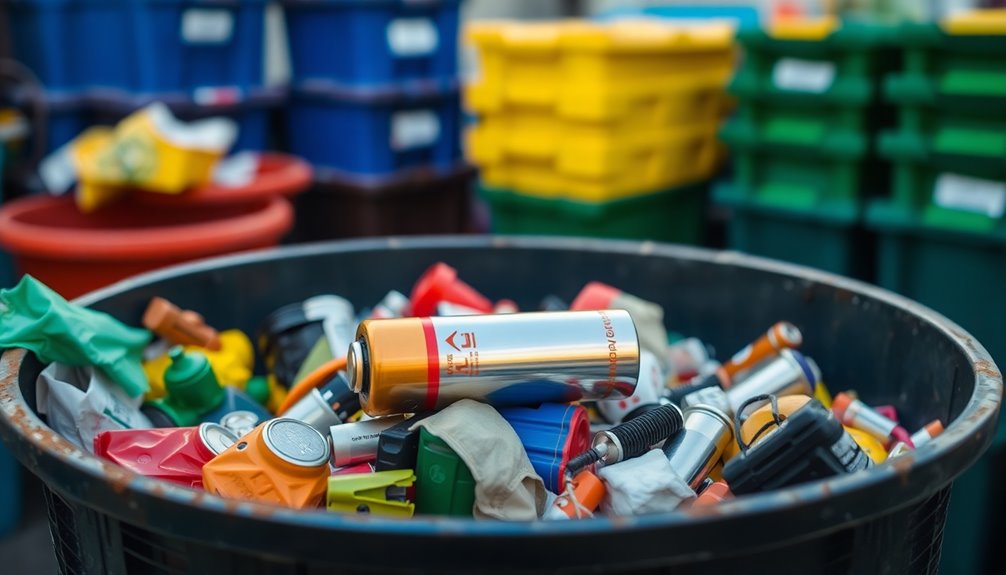
Can you really just toss batteries in the trash? It depends on the type of battery.
Small, non-rechargeable household batteries like AA and AAA are often acceptable for disposal in regular trash in most locations. However, larger batteries, especially rechargeable and vehicle batteries, contain harmful chemicals that can leak and damage the environment.
These must be taken to designated battery recycling facilities. States like California even have strict laws requiring all batteries to be recycled.
Always check your local regulations before disposing of batteries, as improper disposal can pose serious environmental risks.
To protect the planet, prioritize battery recycling whenever possible. It's a simple step you can take to guarantee a healthier environment.
Types of Batteries Explained
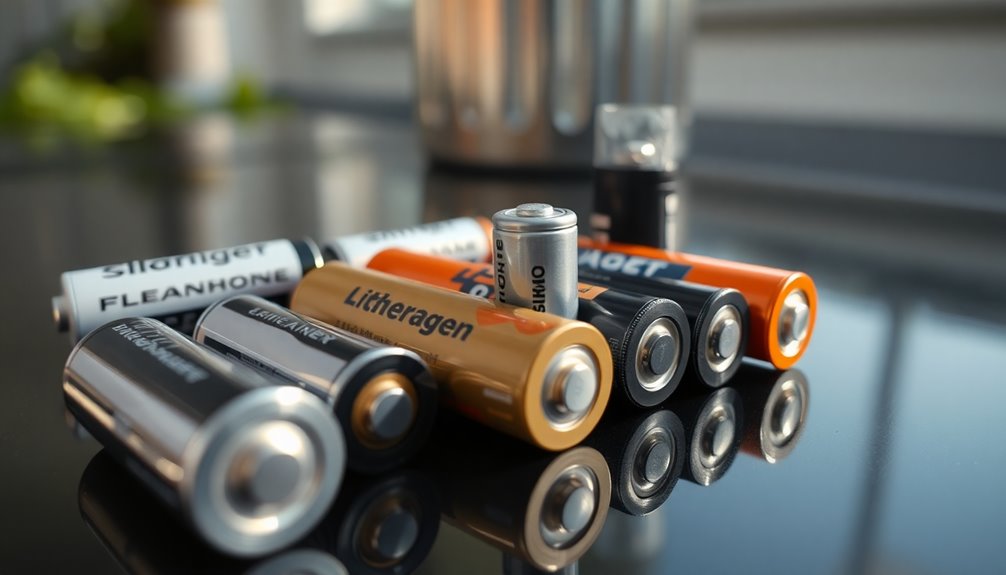
When it comes to batteries, knowing which type you're dealing with can make a big difference in how you dispose of them.
Common household batteries, like alkaline and lithium, have specific disposal guidelines that you need to follow to protect the environment.
Let's explore these battery types and their impacts on both your devices and the planet.
Common Household Battery Types
Batteries are essential components in our daily lives, powering everything from remote controls to smartphones. Among the common household battery types, alkaline batteries are the most widely used, available in sizes like AA, AAA, C, D, and 9V.
You can typically toss these in the trash in most U.S. states, except in California where recycling is required.
Rechargeable batteries, like nickel-cadmium, are popular for power tools and emergency lighting but contain hazardous materials and must be recycled properly.
Lithium-ion batteries, found in smartphones and laptops, should never be thrown in the trash due to fire risks and heavy metal contamination; they also require specialized recycling.
Knowing these differences helps you dispose of batteries responsibly.
#
Environmental Impact of Batteries
Although you mightn't think about it, the disposal of batteries can have a significant environmental impact. Throwing batteries in the trash is risky, as they contain toxic chemicals that can leach into soil and groundwater.
With over 3 billion batteries disposed of annually in the U.S., improper disposal contributes to widespread pollution. Different battery types present unique challenges; for example, lithium-ion batteries are highly recyclable, recovering up to 95% of their materials, while alkaline batteries often lack economic incentives for recycling.
Vehicle batteries pose the highest risk, requiring special handling to prevent contamination. States like California enforce recycling regulations to mitigate these risks.
## Environmental Impact of Batteries
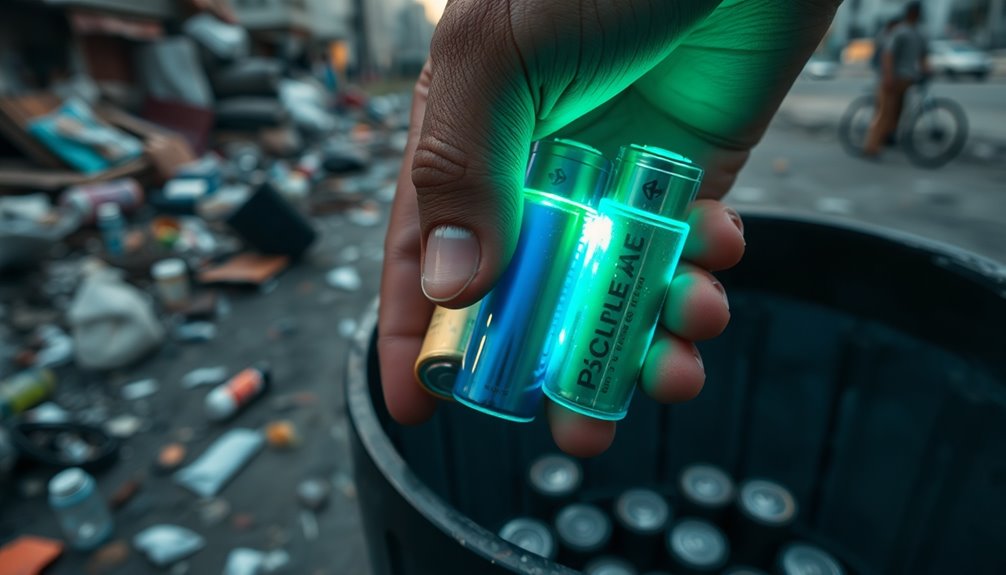
Improperly disposing of batteries poses serious threats to the environment, as toxic chemicals can leach into groundwater and harm ecosystems.
Each year, over 3 billion batteries are discarded in the U.S., creating alarming waste and pollution issues.
Single-use alkaline batteries, often thrown in the trash, contain materials harmful to the environment if they end up in landfills.
Lithium-ion batteries, commonly found in electronics, can be recycled to recover up to 95% of their materials, greatly reducing the need for new resource extraction.
The environmental impact of both battery production and disposal is considerable, leading to urgent calls for better recycling practices and sustainable alternatives.
It's essential to take these factors into account before tossing batteries in the trash.
Safe Disposal Methods

When it comes to disposing of batteries safely, you need to know your local recycling guidelines.
Ignoring these rules can lead to environmental hazards and fines, so always check what's accepted in your area.
Utilizing safe battery collection options, like drop-off centers and manufacturer take-back programs, makes a big difference.
Local Recycling Guidelines
Understanding local recycling guidelines for battery disposal is essential, as regulations can vary widely from one area to another.
In California, for example, all battery types must be recycled at specific facilities, reflecting strict state rules. While many small, non-rechargeable household batteries can usually be tossed in the trash, larger and rechargeable batteries typically require special recycling processes.
The U.S. Environmental Protection Agency (EPA) indicates that single-use alkaline batteries may generally be discarded in the trash, except in states like California where recycling is mandatory.
To guarantee you're following the correct procedures, contact your local sanitation or environmental department. They can provide guidance on available recycling facilities and programs in your area, helping you dispose of batteries responsibly.
Safe Battery Collection
Safe battery collection is essential for protecting both the environment and your community.
While small, non-rechargeable household batteries may go in the trash, larger and rechargeable batteries require special handling.
Check your local regulations to stay compliant.
Here are some safe disposal methods:
- Utilize manufacturer take-back programs for small rechargeable batteries.
- Drop off batteries at designated e-waste facilities.
- Always recycle vehicle batteries at auto parts stores.
- Follow state laws, like California's mandate for recycling all battery types.
Recycling Regulations by State
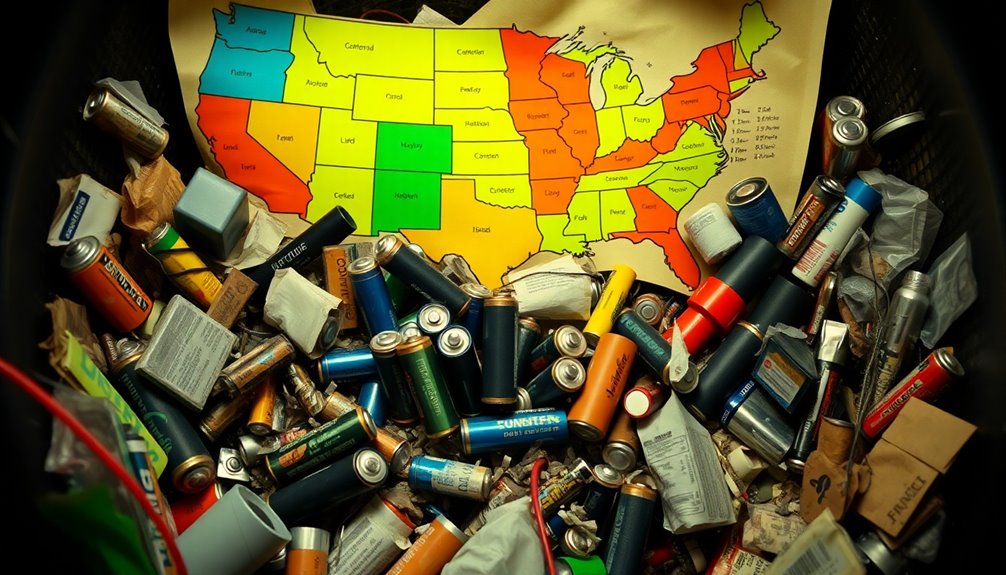
Although battery recycling regulations can vary considerably, most states have recognized the importance of responsible disposal and implemented specific laws to address this issue.
Over twenty states primarily target rechargeable batteries, with California enforcing the strictest laws requiring all batteries to be recycled at designated facilities.
If you're in Vermont, you'll find that battery producers must fund recycling programs, which holds manufacturers accountable for their products.
Additionally, some states mandate retailers to collect batteries for recycling, making it easier for you to dispose of used batteries responsibly.
However, Tennessee currently lacks specific battery recycling requirements, showcasing the disparity in regulations across the U.S.
Myths About Battery Disposal
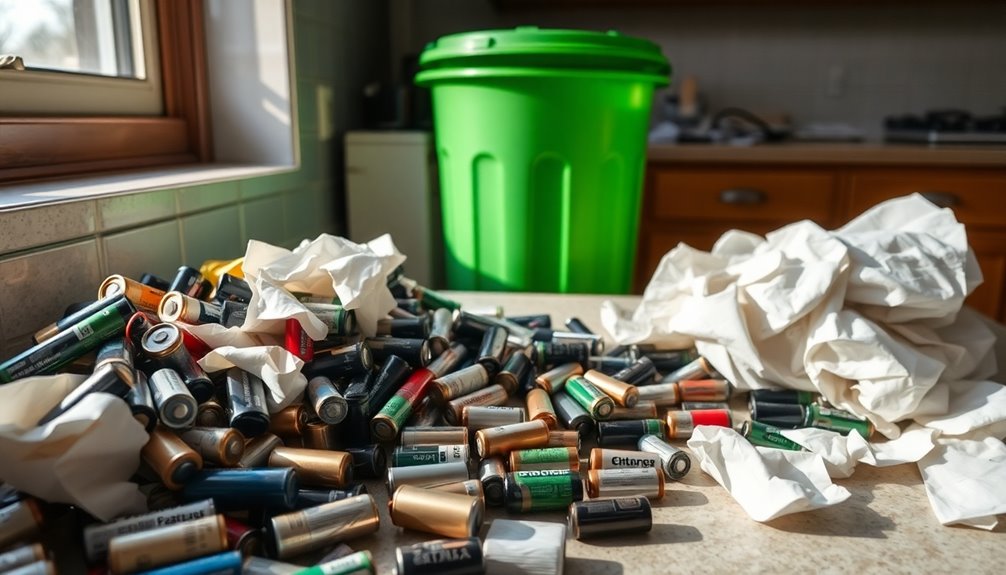
Many people are misinformed about battery disposal, leading to harmful practices. You might think it's okay to toss all batteries in the trash, but that's not true.
Here are some common myths you should know:
- All alkaline batteries are recyclable: Recycling options are limited, especially in California.
- Mercury in batteries is a big threat: The 1996 Battery Act has considerably reduced mercury levels.
- Naturally occurring metals are harmless: Improper disposal can still pollute groundwater.
- Single-use batteries don't matter: Over 3 billion are disposed of annually, raising environmental concerns.
The Environmental Protection Agency emphasizes responsible disposal to protect our ecosystems.
Future of Battery Technology

As technology evolves, the future of battery design promises to bring exciting innovations that enhance both convenience and sustainability.
You can look forward to integrated batteries that expire with their devices, reducing waste and simplifying disposal. Rechargeable batteries are becoming quicker to charge, with some models reaching full power in under an hour. The rise of USB-C as a standard charging method opens new doors for compatibility and design.
Additionally, as we shift to lithium-ion batteries, you'll notice a significant decrease in the waste generated by single-use alkaline batteries. Innovations focused on improved recyclability and sustainability are vital for meeting the growing demand for electric vehicles, making these advancements not just valuable, but essential for a greener future.
Frequently Asked Questions
Is It Safe to Throw AA Batteries in the Trash?
You might think it's safe to throw AA batteries in the trash, especially since they're not considered hazardous in many areas.
However, laws vary by state, like in California, where you must recycle them. Even if they're safe for landfills, leaching chemicals can still pose risks.
Consider using eco-friendly recycling services instead. It's a better choice for the environment and guarantees that you're disposing of your batteries responsibly.
How Do You Dispose of a Bad Battery?
When you've got a bad battery, it's essential to dispose of it properly to avoid hazards.
First, check local regulations since disposal methods can vary. For most household batteries, you can take them to a recycling facility or a designated drop-off location.
If you're dealing with larger or rechargeable batteries, never throw them in the trash. Instead, find a manufacturer's take-back program or an auto parts store that recycles them.
How Do You Get Rid of a Dead Battery?
When you're ready to rid yourself of a dead battery, remember this: don't dump it! Instead, seek safe solutions.
Small batteries might go in the trash, but check your local laws first. For larger or rechargeable batteries, head to a recycling center or participate in a take-back program.
You can also visit resources like Earth911 or Call2Recycle to discover dedicated disposal options nearby.
Protect the planet while you properly part with your battery!
How Do I Dispose of Batteries in Wisconsin?
To dispose of batteries in Wisconsin, you need to know what type you have.
Single-use alkaline batteries can go in the trash, but rechargeable ones like nickel-cadmium and lithium-ion must be recycled.
Check with your local waste management for drop-off sites or recycling programs. The Wisconsin Department of Natural Resources encourages using these resources to keep the environment safe.
Always stay updated on local regulations, as they can vary by area.
Conclusion
So, can you really toss batteries in the trash? The truth is, doing so can lead to serious environmental harm. Many people believe it's harmless, but improper disposal can release toxic chemicals into our soil and water. Instead, consider recycling or using designated disposal methods. As battery technology evolves, safer options are emerging, but it's up to you to make responsible choices today. Let's protect our planet—every small step counts!

